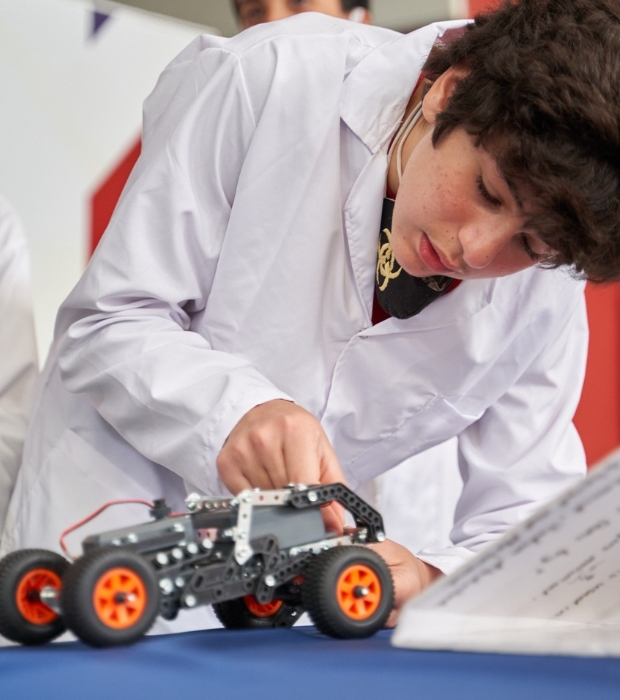STEM-Embedded British Curriculum
STEM is not about learning mathematics and science only, it is about acquiring thinking skills and focusing on real world’s applications of problem solving at a very early stage of their educational journey. Only by then, you can rest assured that your children are confident and empowered to succeed in the future.
All our students from FS2-Y8 are immersed in a STEM Programme that is age-related, as part of the timetabled curriculum, allowing every student to work independently to develop a higher level of thinking skills in a fun and engaging environment where he/she experiments, analyses and learns from his/ her own discoveries.
Students will also work on projects in a team and enjoy being challenged to showcase their potentials and master their problem-solving techniques!
We offer our students a fantastic opportunity to acquire innovation, creativity, collaboration, self-confidence, and critical thinking skills through a series of hands-on activities and well-structured themes that enable them to explore worlds of shapes, forces, electricity, robotics, coding and programming and much more.
The fun is also extended to parents where they can enjoy and celebrate their children mastering their STEM skills through series of scheduled STEM-Quality time, Open Classes and Presentations offered to showcase the project management skills of the little innovators.
At BISM, we are very keen to draw an individual roadmap for every student for their careers and aspirations; since technology is the language of the future, we have implemented an excellent STEM program since 2019 in our school that teaches our students from FS2 to Y6 the main academic pillars of Science, Technology, Engineering and Mathematics, which are referred to as STEM.
Here are five reasons to focus on STEM education in 2024:
1. STEM Jobs are the Future of Our Economy
A robust STEM education is becoming more and more important to our economy. Employment in STEM occupations is projected to grow 8.8% by 2028, and healthcare occupations, which generally require a strong STEM background, are projected to grow even more. Meanwhile, non-STEM occupations will only grow 5%.
What’s more, jobs that require a STEM background are more likely to provide solid wages. STEM workers earned an average of $86,980 in 2019, according to the United States Department of Labor.
2. STEM Teaches Critical Thinking and Innovation
However, STEM education doesn’t only help students who plan to go into STEM careers. The focus on logical thought processes and problem-solving allows students to develop mental habits that will help them succeed in any field.
STEM coursework challenges students to think critically and come up with their own solutions. As a result, students who receive a quality STEM education are primed to become the next generation of innovators.
3. STEM Classes Provide Unique Opportunities for Teamwork
Teamwork is one of the most underrated and important drivers of success. Living and working in the modern world usually requires some degree of collaboration, often with a large and diverse group of people.
STEM classes often involve more team activities than other coursework. Whether students are working together on a lab investigation or collaborating on an engineering challenge, they are actively developing the interpersonal and collaboration skills they will need later on.
4. A STEM Curriculum Helps Students Develop Project Management Skills
STEM courses, especially technology and engineering courses, often involve hands-on projects. Building a simple robot, engine, or computer program often involves multiple steps that are completed over several days.
In the process of STEM education, students learn how to manage their time and break larger projects into smaller steps. That’s a skill that will help them throughout their lives, whether they are working on an office project or doing a home remodel.
5. Recent Events Have Only Made Technology Skills More Important
The current pandemic has only reinforced the importance of technology. With more people turning to Zoom, Slack, and other tools to connect with family members and coworkers, it’s even more important to equip students to use and develop technology.
Even after the pandemic is over, many people and workplaces will retain some of their new technology habits. Building a strong STEM foundation now will set students up for success in 2022 and beyond.







